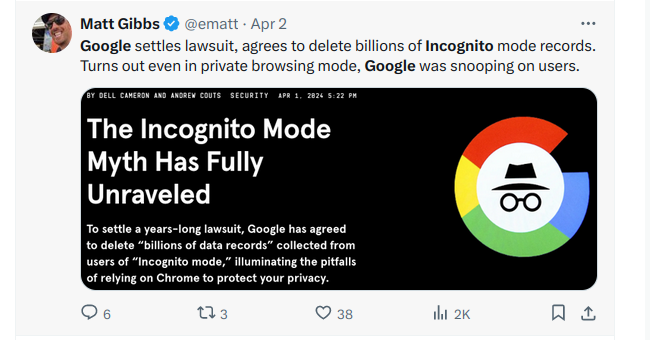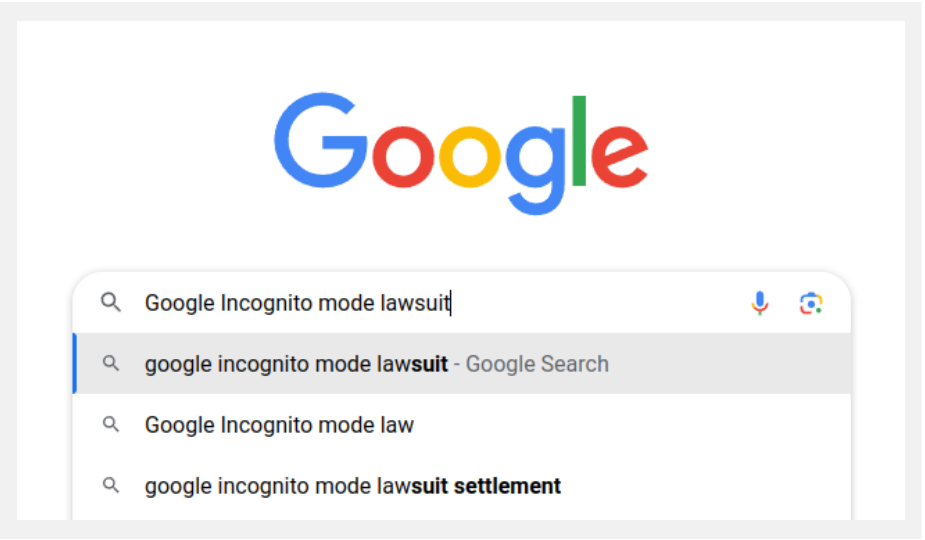Google must destroy $5 billion worth of user data illegally collected in Incognito Mode
If you thought Google's Incognito Mode was private, you're one of the billions around the world blinded by big tech's privacy illusion.
Billions around the world use Google Chrome as their default browser, and when looking for some extra added privacy, they switch to Google’s Incognito Mode. Naturally, given its name, people trust that their browsing is private when this privacy feature is turned on, that there’s no hidden tracking going on and no data collected. Unfortunately, privacy in Incognito Mode isn’t a reality and Google has been tracking users all along! The Silicon Valley tech giant created the illusion of Incognito Mode being Google’s feature for additional privacy protections, but the truth is, it is comparable to any other browser like Chromium or Safari – there’s nothing private about this feature.
When users browse the web incognito, there’s no activity saved to the browsing device – which is why it is called Incognito Mode. But what’s often overlooked and hidden to the user is that a lot of data is being saved in the background. Even in Incognito mode, not only Google, but also internet service providers (ISPs), search engines, website hosts and many other companies still track and monitor your online activity. So while Google is good at giving the illusion of privacy, this latest court case once again highlights how the Silicon Valley big tech deceives its users.
A similar issue is also known about Gmail’s confidential mode: This feature pretends to give users real privacy while all it does is hiding the emails from other email provider – but not from Google itself. True confidential mode would require end-to-end encryption like it is done in Tuta Mail.


The 2020 lawsuit filed against Google by Google users is finally bringing to light the huge amount of data collected by Google in Incognito Mode. Google now has agreed to delete the billions of user records that were collected while users browsed in Incognito Mode – a seemingly private browser.
Google Incognito Lawsuit
As we reported in 2020, a $5 billion lawsuit was filed by Google users, accusing the big tech of tracking their behavior through the private browsing feature Incognito Mode illegally. According to the class-action lawsuit, Incognito Mode allows the user to turn off data collection while using the feature, but this doesn’t stop other Google tools from collecting user data.
According to the proposed class action settlement that was published on Monday, April 1 (and this is not an April’s fools joke!), Google has now agreed to delete or de-identify billions of users’ browsing records that have been collected over the years while using the supposedly private browsing feature.
In the proposed settlement, Brown v. Google, it mandates more transparency and disclosure from Google about how it collects information while users use their incognito function, additionally, future data collection will be more limited.
The settlement valued at $5 billion, has been calculated by determining the value of the extensive data Google collected and stored, the data it will have to destroy, and the data it will no longer be able to collect. According to this proposal, Google must attend to the data collected in private browsing mode since December 2023 and earlier. Any data they do not delete must be de-identified.
“This Settlement ensures real accountability and transparency from the world’s largest data collector and marks an important step toward improving and upholding our right to privacy on the Internet,” the plaintiffs wrote in the settlement filing.
Google spokesperson José Castañeda is trying to downplay the significance of Google’s data collection, as he expressed in a statement, “We never associate data with users when they use incognito mode. We are happy to delete old technical data that was never associated with any form of personalization.”
In addition to deleting or de-identifying users’ collected data, Google will also have to change how it discloses the limits of this privacy feature. Additionally, Google agreed to let users block third-party cookies as a default in Chrome’s Incognito Mode for a 5-year period. This would mean that Google can no longer track users on outside websites while using this mode.
A closer look at Incognito
For many people, opting to use Chrome incognito mode seems like a good way to remain private while browsing the web, and to ensure their search history is non-existent. When using this mode, Google doesn’t keep a record of the web pages you visit, it deletes the cookies after your browsing session and it doesn’t save any information entered into online forms. In summary, it’s a way to browse the web from a device and have that search history cleared on that specific device. But beyond that, it offers no online privacy. For the average user, this may sound great, but once again it’s Google’s privacy illusion.
By default the web browsers most people use, like Apple’s Safari or Microsoft’s Edge keep a trail record of every click, pause, and scroll on the sites you visit and there’s very little privacy or protection in terms of your data. But this isn’t very different for Chrome’s Incognito Mode. Just because your device’s browser doesn’t keep the history of your clicks stored locally, it doesn’t mean you’re privately browsing the web.When you search using Incognito mode your internet service provider (ISP) can still see your activity, the websites you visit can still collect information about you through your IP address and some websites can still track your activity as usual. For more details you can visit Google’s support pages, which go into detail about Incognito Mode and what data is collected when using this feature.
A good write-up about everything that’s wrong with Incognito Mode can be found on Wirecutter.


Big Tech companies like Google, Netflix and Facebook are masters at creating the privacy illusion, but now it has come to light that they’re all in cahoots, sharing and trading your precious data.
While for many being offered ‘private browser’ or ‘incognito mode’ at the click of a button automatically means private and anonymous, the reality is that these big tech companies, are good with their words and painting the illusion of privacy. As we’ve mentioned before – free is never really free on the internet – especially when the service like Google or Facebook makes its profits from selling user data.
If you’re eager to learn more about all the things that Google tracks, check this post and learn how to stop Google’s data collection!
Now that the truth about Incognito Mode is out and publicly available, we hope that more people will join the privacy revolution by looking for truly private alternatives. And luckily today, there are many other private browsers you can use to stop the tracking, data collection and snooping.
So if you’re wanting to go incognito online (but for real this time) we’ve put together a review of best private browsers.
We at Tuta celebrate this victory for privacy. It’s about time that big tech is being hold responsible for their excessive snooping and data collection.

